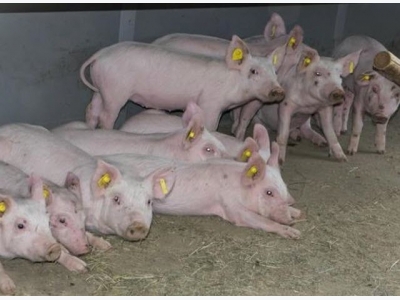EAHE systems may cool livestock facilities effectively

Earth-air heat exchanger best to protect farm animals against heat stress. (Photo: Michael Bernkopf/Vetmeduni Vienna)
Earth-air heat exchanger may be best way to protect farm animals in livestock buildings against effects of climate change.
Without countermeasures, climate change may negatively affect animals in pig and poultry production. Beside the health and well-being of the animals, heat stress also affects animal performance and, as a result, producer profitability.
As the animals are predominantly kept in confined livestock buildings equipped with mechanical ventilation systems, researchers at Veterinarmedizinische Universitat Wien (Vetmeduni Vienna) in Austria examined the inlet air temperature of several air cooling systems.
The best solution, they found, is the use of the Earth for heat storage via an earth-air heat exchanger (EAHE). An EAHE cools in the summer and warms up the inlet air during wintertime.
Without suitable cooling systems, animals kept in confined livestock buildings would face increased heat stress, the researchers said. That would have a negative effect on the well-being of the animals, resulting in lower feed conversion or egg production, which would also have an economic impact.
A comprehensive study conducted by Vetmeduni Vienna, BOKU and ZAMG has now shown that the usual cooling systems, such as EAHE or direct and indirect evaporative cooling — some of which have been established practice since the 1960s — are good choices for cooling livestock buildings.
Apart from the investment costs, the EAHE is the most efficient system, the researchers said. In an EAHE, outside air flows through tubes about 40 m long that are buried at a depth of about 2 m. The system works somewhat like a cellar, which is cooler in the summer and warmer in the winter.
Common cooling systems
The heat stress on animals from temperature and humidity can be measured using the so-called temperature-humidity index. These parameters have been established for people as well as for many farm animals, and they are an important factor for determining which cooling systems best protect animals kept in confined livestock buildings from heat stress.
Three common cooling systems, all of which also find use in residential situations, were examined as part of the study. One system cools the air by using the Earth for heat storage, while the other two systems cool via the direct or indirect evaporation of water.
“These two systems function in a similar way as sweating. The indirect method, however, also uses a heat exchanger to avoid humidification,” study director Günther Schauberger explained.
“Our calculations showed that an earth-air heat exchanger is the most efficient system for confined livestock buildings. The method cools the air accordingly during the summer, and heating the inlet air in winter significantly improves the flow rate and, thus, the air quality in the building,” Schauberger said. “This makes is possible to completely avoid heat stress for the animals.”
Direct evaporative cooling, on the other hand, has the disadvantage that cooling the air also results in increased humidity. Indirect evaporation method avoids this disadvantage, but the cooling is less efficient. “In the end, however, you also have to consider the investment of such an air preparation system, which we did not include in our analysis,” Schauberger said.
The study was conducted as part of the Austrian Climate Research Program.
Related news
 Coffee exports - carelessness is the loss of second Position
Coffee exports - carelessness is the loss of second Position Vietnam is the second largest country in terms of coffee production and export. To maintain this position, while enhancing added value for the coffee industry
 New EU rules on free-range chickens came into force
New EU rules on free-range chickens came into force New EU rules to extend the period during which free-range chickens’ access to open-air runs can be restricted came into force.
 More countries acting to combat antimicrobial resistance in agriculture
More countries acting to combat antimicrobial resistance in agriculture Antimicrobial medicines are widely used in livestock, poultry and aquaculture operations to treat or prevent diseases.